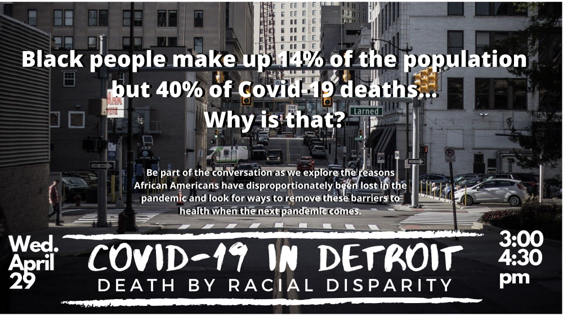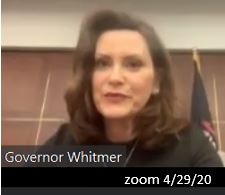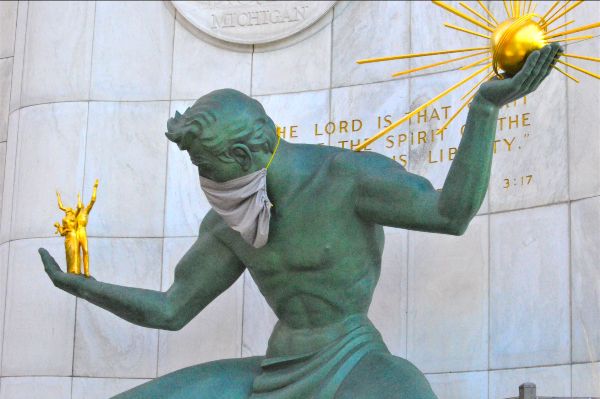Yesterday I attended two zoom meetings, one originating out of Detroit, and one out of Lansing. The contrast was stark. The difference in the way they broached racial disparity, a pandemic within the pandemic, was startling.
For Detroit, these zooms showed that the pandemic has not changed anything except accelerated Black deaths. COVID19 has served to take the lid off the obscene racial reality. The reality is no less harsh for poor people of all colors. To be Black or poor means you were already in a public health crisis before the pandemic; you were set up to die in higher numbers. Herein lies one of the darkest truths of today’s American government.
There are Michiganders who say that Blacks deaths are okay, or even good and expected. As I finish this article, they are in the state capitol with guns threatening the life of the governor. That’s not okay either. It’s not unrelated. Michigan is more than a COVID hotspot; it’s a hatred hotspot.
Racial disparity is a national moral issue that can only be solved via political action.
Our government response is tentative at best. Thanks to Governor Whitmer for acknowledging there is a racial problem, especially in context of so much resistance and diversions. To overcome the prevailing denial and suppression, to prompt actual change, it is increasingly leaning to mass mobilization.
One zoom was feeling the pain, sharing real-time stories and conditions, and working to stay sane and survive the blatant racial disparities. The other zoom kept a greater virtual distance; they acknowledged the racial disparity, and the governor expressed hope to get it on the policy agenda after emerging from the crisis.
One zoom drew 62 people, all of whom were visible on your screen, and all but one speaker was black. The other zoom drew over a thousand, most of whom were blocked from being seen, and none of the speakers were black. One zoom used the online and security basics, and the other had every bell and whistle known to zoom world.
It was a zooming of the haves and the have-nots. But which is which depends on whether you are talking about love, or money. One zoom leaned toward love, the other toward the money.
Each of today’s Zoom Meetings Provided insight, Hopes and Fears

One meeting featured Elder Leslie Mathews of Detroit, Justice and Interfaith Organizer for Michigan United. She opened the meeting with a revelation of how deaths have devastated her family. Others openly and passionately shared stories and drew strength from each other. Panelists included Lakisha Watson-Moore, Deborah Burke, Vickie Dobbins, Lisa Jackson, John Duckworth, and Keion Harris. They are living through the racist trends and policies that undermines Detroit life. And now, they must watch it kill loved ones. Black people show the will and insights to improve conditions. But even in this dire time, they are left to conclude they are alone.
The other meeting was a Disability Town Hall, coordinated by the powerful Small Business Association of Michigan (SBAM). The moderator was Brian Calley, former Lieutenant Governor and Republican Governor candidate. The panel described how they extended their services in context of corona. At times it felt a bit Trumpian. They absolutely are doing good things for disabled, including children. It would have helped to show an example. I have my own important disability questions. So it bothered me that the SBAM solicited questions ahead of time, but only one was addressed.
 Governor Gretchen Whitmer came in for the last half of the SBAM meeting.
Governor Gretchen Whitmer came in for the last half of the SBAM meeting.
The dialogue leaned a bit toward bi-partisan exploring and political posturing, not necessarily her fault. Governor Whitmer has readily admitted she has her hands full.
The Governor started with remarks about her newest executive order, which calls for all patients to have equitable access to healthcare resources and services from state-owned operations. Mark McWilliams, of Michigan Protection and Advocacy Services, seemed relatively progressive. He asked the Governor how the new order might be applied to the racial disparity which is now in sharp focus, manifested in deaths suffered by Blacks in Detroit.
She said the R Word
Governor Whitmer said there is a racial component in Michigan that is becoming known as real. She referenced her State-of-the-State message calling out Black pregnancies as three times more dangerous. Racism is not specifically called out in the new order, but it did say there is to be no implicit bias or associated healthcare provisioning. She said that, once out of the crisis, it should be on the policy agenda. She said we want to be “tackling long time issues that have been a reality, but haven’t been seen as sharply as we see right now”.
So, the Harsh Reality
The Governor also said that,” if we can’t learn now based on what we’re seeing, then we haven’t achieved our potential”. The Black people whose families are being decimated might agree. But they would definitively, in the face of death, say they need meaningful action now, specific to their cultural needs.
As the Governor pointed out, the order doesn’t really change anything, and peoples’ behavior is the key. Since there is latitude in such orders, and people might or might not follow them, should racism have been called out in the order? Could the state not be put on notice that there is a race problem – or is the fear and hatred so dense that it can not even be mentioned?
Sorry, Blacks have never made the cut. So, when the pandemic is over, funds will be tighter and everybody will be lined up to fight for theirs. It can’t be another someday that never comes. The resolve that Blacks show is a remarkable display of strength and courage. They want to live. God is with them, by the way.
Task forces, studies, actions, and oversight that does not include real participation from the affected Black community is proven ineffectual. Anything less is an expensive joke.


Leave a Reply
You must be logged in to post a comment.